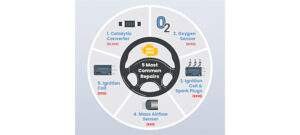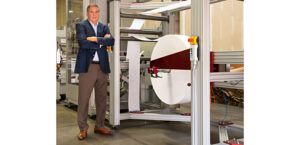The aftermarket has gained a reputation of being recession resistant — however, it is less recession-proof today than it has been before
Fort Wayne, Ind.—Over the years, the aftermarket has gained a reputation of being recession resistant. However, the aftermarket’s product mix has undergone significant changes over the past 25 years, and today it is less recession-proof than it has been before.
“The aftermarket’s recession resistant reputation is based largely on the belief that its volume consists of non-discretionary products, which are necessary for vehicle operation,” states the latest Lang Aftermarket iReport. “However, for a number of years, discretionary products, which are not necessary for vehicle operation, have expanded their aftermarket share. This will affect how the next recession (likely this year) will impact the car and light truck aftermarket.”
The following are a few highlights and key takeaways from the analysis.
Recession Around the Corner
Recessions have generally occurred in the U.S. at six-to-eight-year intervals, and one is overdue. Many analysts believe that a recession will likely hit the U.S. in the next few months, if it is not here already.
The last two recessions (aside from the COVID-19 induced) occurred in 2001 (March to November 2001) and 2008 (December 2007 to June 2009. Examining them can suggest what might be in store for the aftermarket when the next recession strikes.
2001 Recession
During the 2001 recession, which lasted six months, aftermarket growth decreased by more than two-thirds, as light vehicle aftermarket growth fell below 1.0%.
It plateaued at that level through 2002 as the aftermarket didn’t rapidly recover when the recession ended. In 2003, light vehicle aftermarket product sales finally rebounded to 2.8%.
2008 Great Recession
The 2008 Great Recession notably impacted the aftermarket, affecting sales more severely than at any time in the previous four decades.
Car and light truck 2008 product volume decreased to -1.9%, down dramatically from the 2.1% gain in 2007. Car and light truck aftermarket sales remained negative during 2009, falling another 0.5%.
New Vehicle Sales Collapse
The 2008 Great Recession differed from all other recessions of the past six decades in its 35% drop in new car and light truck sales coupled with a significant shift in the sales mix of domestic and foreign nameplates.
Miles Driven Hit Hard
Miles driven also took a lasting impact from the 2008 Great Recession. Annual mileage peaked in 2007 and failed to top that annual driving level for another six years.
Recession Impact on Discretionary Purchases
The next recession will cut discretionary automotive product purchases (such as accessories) and could reduce overall aftermarket product growth by more than 80% from its 2021 recovery pace following the impact of COVID-19.
During the economic turmoil of 2020, accessory sales flourished despite lower volume among many aftermarket products, mainly boosted by stimulus checks reaching Americans with time on their hands, who decided to spend it on modifying and upgrading their vehicles.
Without stimulus checks flowing in the next recession, accessories will be substantially affected.
Likely Effects of Next Recession
The next recession (likely this year, states Lang) will affect the aftermarket in several significant ways.
• First, aftermarket sales volume will be negatively affected, particularly discretionary product purchases. The next recession will cut the strong recovery recorded in 2021 by more than 80%, especially if it arrives this year.
• Second, new car and light truck volume will be impacted by the next recession, with annual volume staying below 15 million and perhaps dropping under 14 million, depending on supply chain issues affecting light vehicle production.
• Third, miles driven will be reduced, with the likelihood of annual mileage lower than the 2019 pre-COVID driving level.
The aftermarket impact of the next recession will be intensified by supply chain issues (some of them directly related to the recession) that will “play havoc” with new vehicle production and various types of vehicle repair, as parts take much longer than usual to reach repair sites or are not available at all.








Comments are closed.